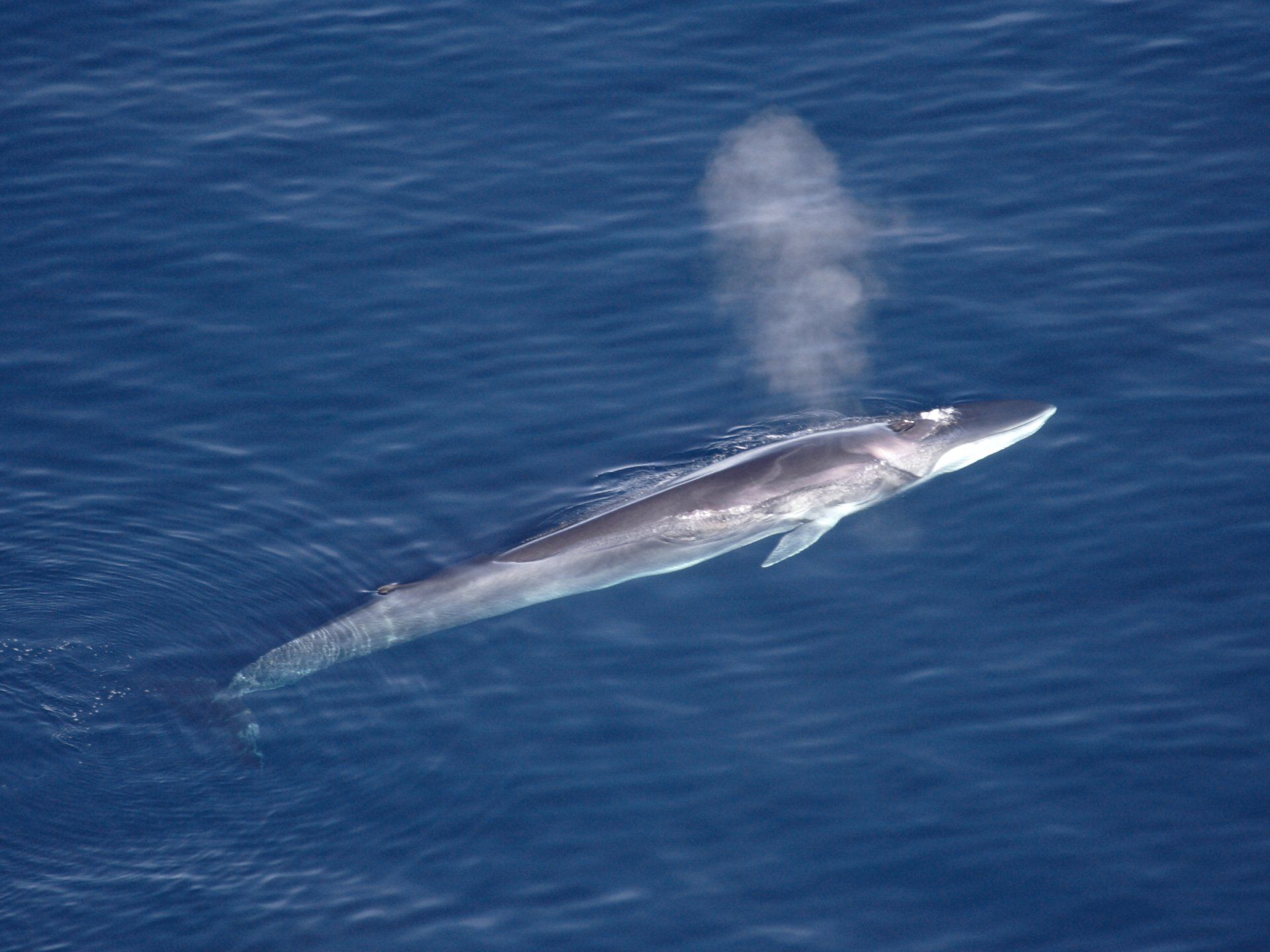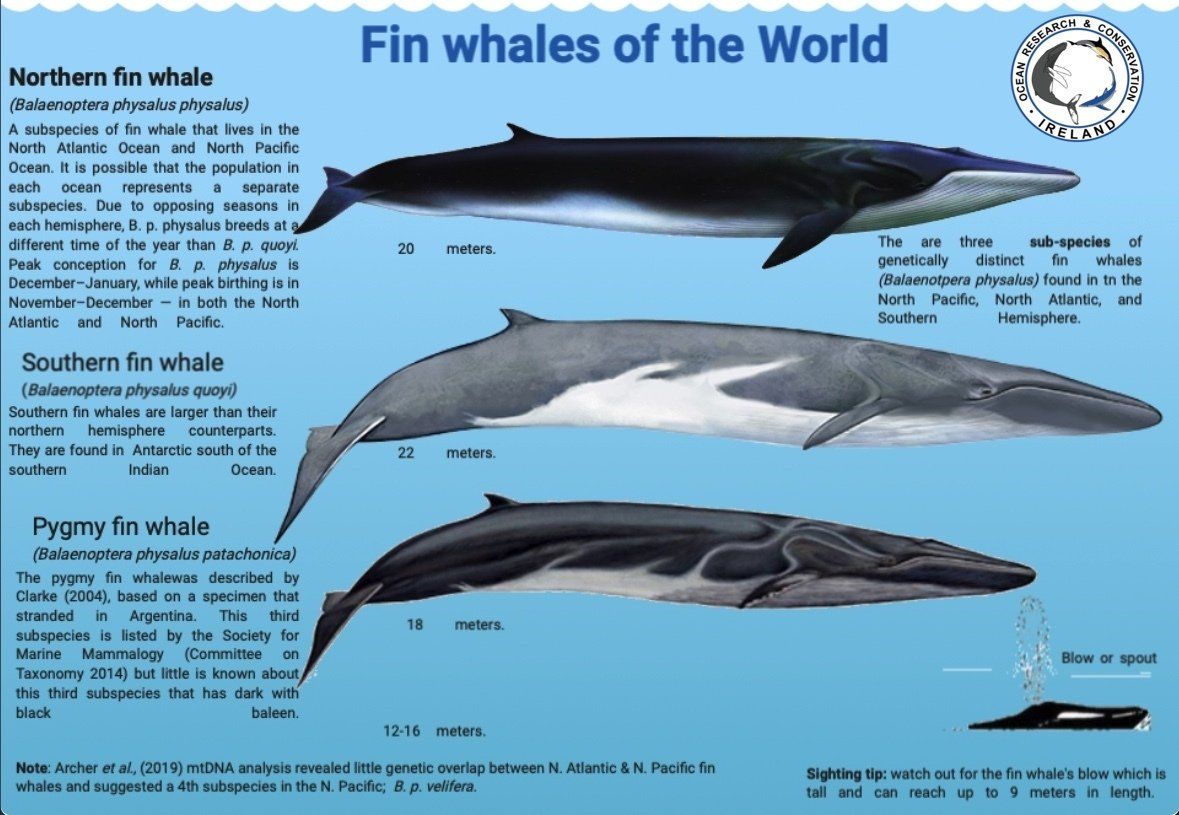New fin whale subspecies discovered in the North Pacific Ocean!
Genetics research has revealed a new subspecies of fin whale in the North Pacific Ocean, highlighting the diversity of cetaceans and just how little we know about their taxonomy.
North Atlantic fin whale (Balaenoptera physalus). Source: wiki commons.
A new subspecies of fin whale has been discovered by researchers at NOAA, Ocean Associates Inc., Cascadia Research Collective, Tethys Research Institute, and Universidad Autónoma de Baja California Sur. The research published in the Journal of Mammalogy
, has described the new subspecies as Balaenoptera physalus velifera
, which means "carrying a sail" in Latin.
Fin whales are the second-largest animal on earth and the fastest whales in the ocean, up to 22 meters in length and can reach speeds of up to 37 km/hr. This made them one of the last whale species hunted to the edge of extinction. Between 1947 to 1987 whalers killed about 46,000 fin whales in the North Pacific Ocean. Today, they remain one of the least known large whale species. They mainly travel the open, and are found from temperate to subpolar oceans around the globe.
It had long been suggested that North Pacific fin whales were a separate taxa, however, until recent advances in genetic technologies, scientists did not have enough evidence to prove it. Though advances in genetics, researchers can more easily and cheaply sequence and analyse the entire genome.
Lead author of the new study Eric Archer, a geneticist at NOAA Fisheries' Southwest Fisheries Science Center (SWFSC) in La Jolla, California, said "The increasing study of cetacean genetics is revealing new diversity among the world's whales and dolphins that has not been previously recognised." Genetic samples for the study were collated from the SWFSC. The center's Marine Mammal and Turtle Molecular Research Sample Collection is one of the largest collections of marine mammal genetic material in the world. They also obtained additional samples from museums.
Up to now three subspecies of fin whales ( Balaenoptera physalus
) were recognised, which included the northern fin whale ( B. p. physalus
), the southern fin whale ( B. p. quoyi
), and the pygmy fin whale ( B. p. patachonica
) ( Edwards
et al
., 2015
).
Fin whales (Balaenoptera physalus) of the world. Copyright: O.R.C.Ireland2019.
The Northern Hemisphere subspecies encompasses fin whales in both the North Atlantic and North Pacific oceans. Where a species is defined as “a separately evolving lineage composed of a population or collection of populations,” and a subspecies is defined as “a population, or collection of populations that appears to be a separately evolving lineage with discontinuities resulting from geography, ecological specialisation, or other forces that restrict gene flow to the point that the population or collection of populations is diagnosable distinct.”
Location of samples with control region. Source: Archer et al., 2019.
Traditional taxonomic designation was based on analysis of morphological characteristics such as skulls, for whales however, these may weigh hundreds of pounds. Given a fin whale size, few museums or research institutions can house such collolosal skeletons and have enough samples to compare species from around the world.
Modern genetic sequencing techniques, allow scientists such as Barbera Taylor, head of the SWFSC's Marine Mammal Genetics Program, to sequence the full mitogenome (mtDNA) and single-nucleotide polymorphism (SNP) genotypes, between fin whales from the Atlantic and Pacific Oceans, showing they diverged from one another several thousand years ago.
About 14,000 to 18,000 fin whales in the northern Pacific Ocean will be affected by the new subspecies designation as the Endangered Species Act (ESA) recognises separate subspecies. In other words, managers can target ESA safeguards for those subspecies that need it even when other subspecies may have recovered. This could make conservation efforts more efficient and effective.
References:
Frederick I Archer, Robert L Brownell, Brittany L Hancock-Hanser, Phillip A Morin, Kelly M Robertson, Kathryn K Sherman, John Calambokidis, Jorge Urbán R, Patricia E Rosel, Sally A Mizroch, Simone Panigada, Barbara L Taylor, Revision of fin whale Balaenoptera physalus (Linnaeus, 1758) subspecies using genetics, Journal of Mammalogy , Volume 100, Issue 5, 22 October 2019, Pages 1653–1670, https://doi.org/10.1093/jmammal/gyz121
- © Ocean Research & Conservation Ireland (ORCireland) and www.orcireland.ie , est. 2017. Unauthorized use and/or duplication of this material without express and written permission from this site’s author and/or owner is strictly prohibited. Excerpts and links may be used, provided that full and clear credit is given to Ocean Research & Conservation Ireland and www.orcireland.ie with appropriate and specific direction to the original content.
SHARE THIS ARTICLE
















